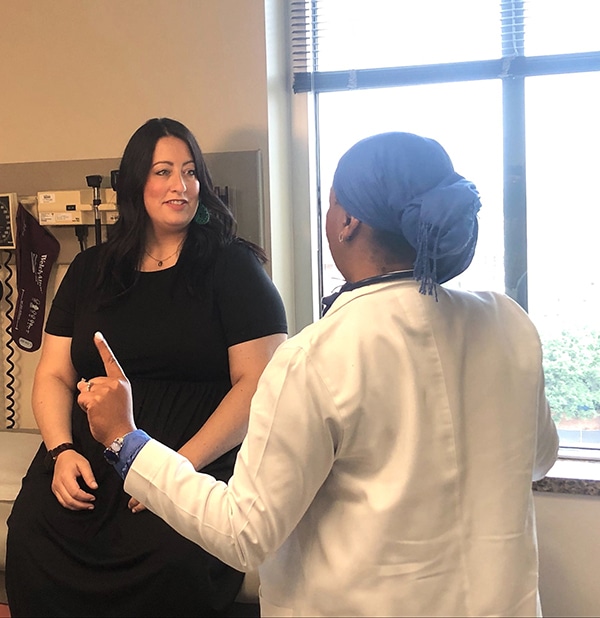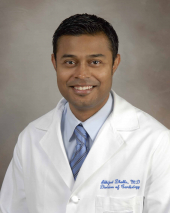A stroke is the last thing Jamie McCown imagined for herself – especially at age 39. She routinely visited her primary care physician and gynecologist, and didn’t have high blood pressure, cholesterol problems, or cardiac issues that usually correlate with having a stroke. But at eight weeks pregnant, Jamie experienced a stroke in her sleep.
“I remember waking up during the night and being restless,” Jamie said. “In the morning, I woke up and had complete peripheral vision loss on the right side. I work for an ophthalmologist, and I knew something was wrong.”
Jamie could still see in front of her, but nothing to the right. There were no other symptoms. She got dressed and went to work, which now she admits wasn’t ideal not knowing her condition. Testing in her ophthalmologist office revealed a neurological issue, not a visual one. Brian Wright, MD, her employer, quickly connected her to Spiros Blackburn, MD, associate professor of neurosurgery at McGovern Medical School at UTHealth Houston. Jamie experienced extra concern as she waited for information, based on her father’s history with brain cancer. Even though her father’s brain cancer was not hereditary, Jamie said her mind automatically went there.
The MRI didn’t show a pituitary gland tumor like doctors initially expected, but that she’d had a stroke. Everything changed at that moment for Jamie. Her biggest concern was if her baby was OK. Jamie became pregnant through in vitro fertilization (IVF), due to her medical history with polycystic ovary syndrome.
“I had gotten to a point in my life that I didn’t know if kids were going to be in my future, although it’s something I always longed for,” Jamie said. “I’d always desired to be a mother. I have two wonderful bonus kids through marriage.”
As a result of her husband’s new job that covered IVF expenses, the path to pursue IVF suddenly opened up for them. She tied it to her faith. “God has the right timing for everything,” Jamie said, “and I think He guided us in a direction that we would be able to financially afford it.”
Understanding the stroke

Doctors transferred Jamie to a stroke unit after her initial diagnosis, where she stayed a week for monitoring and additional testing. Surprisingly, they discovered a hole in her heart, a patent foramen ovale (PFO). All babies are born with a hole in their heart, but it usually closes within the first few months on its own. When it doesn’t close, it’s usually not problematic unless the blood contains a clot.
“The combination of the IVF medication plus the coagulation of blood and the hole in my heart allowed a blood clot to go to my brain,” Jamie said.
Jamie’s maternal fetal medicine doctor, Diana Racusin, MD, OB-GYN with UT Physicians and assistant professor at McGovern Medical School, referred her to Anjail Sharrief, MD, neurologist with UT Physicians. Clinically, Sharrief said Jamie had a visual field deficit on one side but no other neurological impairment. The location of her stroke, in the occipital lobe in the back of the brain, was important to learn because that area of the brain affects vision. Fortunately, she didn’t have the stroke in an area that controls movement, language, or sensation.

“People who are more likely to have clotting disorders may be more likely to have a stroke in association with the PFO, which is basically a communication between the right side and left side of the heart,” said Sharrief, associate professor of neurology at McGovern Medical School at UTHealth Houston.
Pregnancy increases the risk of strokes for a number of reasons, according to Sharrief. First, there are hormonal changes, which in pregnancy, can increase the risk of blood clots that can lead to a stroke. Changes in blood pressure can also be associated with increased risk for stroke and other cerebral vascular or brain complications in pregnancy.
“Older maternal age, obesity, and even migraines are other things that can increase the risk of stroke in pregnancy,” said Sharrief, director of stroke prevention for the UTHealth Houston Institute for Stroke and Cerebrovascular Diseases and director of the Stroke Transitions Education and Prevention (STEP) clinical program she founded in 2014.
Jamie said Sharrief was great to work with, very knowledgeable, and answered all her questions.
“She made sure I knew what happened, what I needed to look for, and was an important part of the process,” Jamie said.
Delivering a miracle
Jamie was induced at 37 weeks and delivered a healthy boy, Levi, on December 10, 2022 – “7 pounds, 2 ounces of perfection,” as Jamie described him.
“When he came in our life those first couple of days, first couple months, he was truly the missing puzzle piece. He definitely completed it,” Jamie said. “Knowing everything I went through and that he’ll be my only one, I really try to enjoy every piece of motherhood and not take things for granted.”
Collaborating as a team
Jamie’s physician team worked together throughout her pregnancy and after to provide safe and optimal care for Jamie and her baby. All of her physicians were within UT Physicians, which Jamie said she really liked, especially to simplify the process.
“Everyone’s in communication,” Jamie said. “When you’re going from one doctor to the next, you’re not having to tell your story over and over again.”
Part of the teamwork involved providing medication to prevent preeclampsia as well as blood thinner shots to prevent more clots from forming during the pregnancy. And ultimately, closing the hole in her heart.
“It’s really important to have this kind of collaboration during pregnancy,” Sharrief said. “Early in the pregnancy, I worked with her maternal fetal medicine doctors to make sure we agreed on the correct treatment to prevent stroke and managing complications she had during pregnancy. And we consulted with cardiology about medications we were going to use after the PFO closure.”

Abhijeet Dhoble, MD, interventional cardiologist with UT Physicians and associate professor at McGovern Medical School at UTHealth Houston, performed the closure of Jamie’s PFO two months after Levi’s birth. Dhoble said it was a very collaborative effort between the heart-brain team — cardiology and neurology.
“We decided to keep her on blood thinners until she delivered the baby, and then close it,” Dhoble said. “We did not want to expose the unborn child to unnecessary radiation that can happen during the procedure due to X-ray use.”
Dhoble said Jamie had aneurysmal interatrial septum and a large shunt across her PFO that categorized her condition as “high risk.” By closing her PFO, he said it reduced her future stroke risk by more than 60%.
Experiencing life after stroke
The most challenging aspect for Jamie experiencing a stroke was having a blind spot on her right side. The vision has improved, but not completely, in the periphery. She’s made adaptations in her driving, but adjustments were also necessary for just walking around. She said it’s almost hard to admit her challenge, after hearing others speak on their stroke recovery, because she was blessed with minimal impairment.
“I count my blessings every day, because it could have been a lot worse. I could have died,” Jamie said. “I’m able to drive, work, take care of my son, and be a wife – the things I enjoy most.”
Going back to her faith, Jamie said she believes things in life sometimes happen for a reason: to teach us a lesson or affect the lives of others down the road.
“Why this happened to me, I don’t know. God had a plan, and there is a purpose for everything, whether it be that I’m here doing this interview to help somebody else,” Jamie said. “I just had faith that everything was going to be OK. I chose to look at the positive and not the negative. And I had this child to look forward to!”



